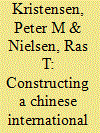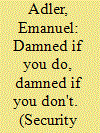|
|
|
Sort Order |
|
|
|
Items / Page
|
|
|
|
|
|
|
| Srl | Item |
| 1 |
ID:
124406


|
|
|
|
|
| Publication |
2013.
|
| Summary/Abstract |
Chinese scholars are debating whether, and how, to innovate a Chinese theory of International Relations (IR). This article examines the driving forces behind this theoretical debate. It challenges the commonsensical link between external events in the subject matter (i.r.) and theorizing (IR), which suggests that the innovation of a Chinese IR theory is a natural product of China's geopolitical rise, its growing political ambitions, and discontent with Western hegemony. We propose instead a sociological approach to intellectual innovation which opens the black box of knowledge production, and argue that theoretical innovation, in China and elsewhere, is best understood as an interplay between internal and external layers. The internal academic context comprises intellectuals pursuing prominence, with each intellectual trying to carve out a maximally distinct position in order to receive attention from their peers-theorizing a Chinese IR theory being one important way of doing this. The external layer-which ranges from power politics to sociopolitical developments-affects this process indirectly by providing more research funds and autonomy to the more immediate institutional environment where control over rewards such as research funds, promotion, and publications affects what kind of work is done, with theorizing being increasingly rewarded.
|
|
|
|
|
|
|
|
|
|
|
|
|
|
|
|
| 2 |
ID:
097369


|
|
|
|
|
| Publication |
2010.
|
| Summary/Abstract |
This article seeks to initiate a new round of strategic intellectual innovation in an era when threats posed by non-state terrorist organizations and their state supporters do not resemble Cold War threats. Based on an interpretative sociological reading of the concepts of power, security, and rationality, it argues that a "damned if you do, damned if you don't" dilemma is to the post-Cold War era what the danger of surprise attack or unintended nuclear war was to the Cold War: the defining structural threat of international politics. The dilemma leaves states confronting asymmetrical warfare with the choice of reacting with force to a terrorist act or practicing appeasement. Neither approach, however, can achieve the goal of putting an end to terrorism. Deterrence sustains the dilemma by providing a rationale for why force should be used and why self-restraint is irrational. This article proposes a third option, defusing, which may be accomplished by denial (preventing provocateurs from dragging states into the use of force) and restructuration (transforming the structure and rules of the situation). Defusing relies on "performative power"-the capacity to project a dramatic and credible performance on the world stage and to decouple social actors, their audiences, and their most deeply held strategic beliefs. The force of the argument is illustrated by examples from the global "war on terror," the 2006 Lebanon War, the 2008-09 operation "Cast Lead" in Gaza, and the Iranian nuclear crisis.
|
|
|
|
|
|
|
|
|
|
|
|
|
|
|
|
|
|
|
|
|